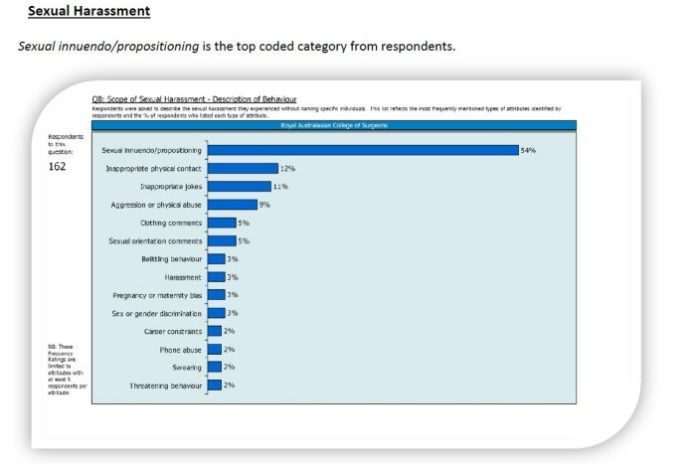Nearly half of all surgeons across all specialities have experienced discrimination, bullying or sexual harassment, a new report has found.
Key points:
- Nearly half of surgeons experience discrimination, bullying or harassment
- Discrimination during pregnancy common
- Victims feared making complaints
- College of surgeons issues formal complaint, promises action plan by November
An expert advisory group, appointed by the Royal Australasian College of Surgeons (RACS), has presented their research to the group.
The RACS commissioned the independent report into the behaviour after senior vascular surgeon Dr Gabrielle McMullin said complaining about harassment could ruin a trainee’s career.
The findings included stories of surgeons being expected to provide sexual favours in return for tutorship, with other surgeons suffering constant belittling, intimidation and public humiliation.
Head of the expert advisory group Rob Knowles said he was shocked by the findings.
“I was surprised and disturbed at the depth and the entrenched nature of bullying and harassment both across the profession and the health care system generally,” he said.
The report found bullying was the most common, reported by almost 40 per cent of surgical fellows, trainees and international medical graduates.
Almost 20 per cent of surgeons reported discrimination and workplace harassment, with 7 per cent detailing instances of sexual harassment.
The most prevalent form of discrimination was cultural, with one response reading: “They want you out of the country or they want you dead.”
The report outlines shocking stories of abuse including:
- “I was expected to provide sexual favours in his consulting rooms in return for tutorship.”
- “Throughout the course of my training, I have been sworn at and criticised.”
- “I was subject to belittling, intimidation and public humiliation.”
In response, RACS president Professor David Watters has written a formal apology to all those who suffered bullying, discrimination or sexual harassment.
Four Corners: At Their Mercy

A toxic culture of belittling, bullying and bastardisation is poisoning the lives of young trainee doctors in some of our major teaching hospitals.
“The individuals who shared their stories have described the devastating impact this has had on their personal and professional lives,” Professor Watters said.
“As president of the college, on behalf of all fellows, trainees and international medical graduates, I apologise.”
The college admitted it should have done more to help those who were affected.
“I apologise to everyone of you who has suffered discrimination, bullying or sexual harassment by surgeons. I also apologise to all other health workers on whom surgeons have inflicted these behaviours,” Professor Watters said.
 Photo: Sexual innuendo or propositioning was the most common form of sexual harassment reported. (Supplied: Royal Australasian College of Surgeons)
Photo: Sexual innuendo or propositioning was the most common form of sexual harassment reported. (Supplied: Royal Australasian College of Surgeons)
Female surgeon told to get ‘tubes tied’
Stories of discrimination around pregnancy, mainly during training, were common.
A number of female surgeons felt forced to keep their pregnancies “secret” for as long as possible “because of ramifications for the hospital”, as they could not easily be replaced or simply to retain their place at that stage of their career.
- “I was required to do 30-hour shifts in the last weeks of pregnancy.”
- “I had to make up my maternity leave when I returned by doing all the on-call roster, nobody else taking any other type of leave had to do this.”
- “I was told I would only be considered for a job if I had my tubes tied.”
Making a complaint ‘career suicide’
The report found the main factor preventing victims from taking action was the effect on future career options.
It said those being bullied and harassed did not trust the people handling complaints, saying the people responsible for complaints were often the perpetrators.
“Nothing is anonymous in medicine … even filling in this questionnaire is extremely uncomfortable,” one comment read.
“They report making a complaint as ‘career suicide’ and fear being ‘black-balled’ in areas such as selection, references, job recommendations, appointment processes, and career path,” the report said.
“I still fear that he could ruin my reputation and destroy my life,” one respondent said.
The RACS has accepted all the report’s findings and promised an action plan by November.
Changes will include increasing transparency and external scrutiny of the college, making it safe for people to make a complaint and improving surgical education and training.
Key report findings
- Forty-nine per cent of fellows, trainees and international medical graduates reported being subjected to discrimination, bullying or sexual harassment
- Fifty-four per cent of trainees and 45 per cent of fellows less than 10 years post-fellowship reported being subjected to bullying
- Seventy-one per cent of hospitals reported discrimination, bullying or sexual harassment in their hospital in the last five years, with bullying the most frequently reported issue
- Thirty-nine per cent of fellows, trainees and international medical graduates reported bullying, 18 per cent reported discrimination, 19 per cent reported workplace harassment and 7 per cent reported sexual harassment
- Discrimination is most commonly about cultural or racial discrimination (33 per cent), followed by sexual discrimination (16 per cent)
- The problems exist across all surgical specialties
- Senior surgeons and surgical consultants are reported as the primary source of these problems

